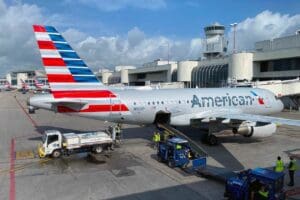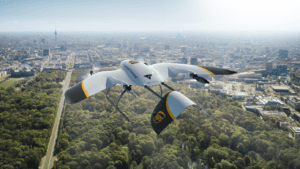 Across the country stay-at-home orders have been extended for another month as we grapple with the ongoing reality of COVID-19. This means that schools, libraries, daycare centers, and other non-essential businesses are closed for the foreseeable future. As a father of young children, this certainly poses a unique set of challenges as my wife and I balance work and home life in the confined space that is our home. However, I have been thinking a lot lately about how different this would have been had it occurred when I was a kid. The hardest part for most everyone has been the lost social component of daily life. However, in today’s connected world, we have a myriad of options of how to stay connected. Just in the last week, my wife and I joined a Zoom video call for a happy hour celebration of a friend’s birthday, my daughter has had a skype call with friends from school as well as a virtual story-time with her first-grade teacher, my son has been posing daily survey questions to his classmates via email and attended a “crossfit for kids” virtual class, my youngest daughter has donned multiple Halloween costumes to try to scare my parents during a Zoom session, and my whole family had a video conference with my brother-in-law in Copenhagen just to catch up. While things are clearly challenging right now, at the very least, technology is enabling us to maintain some sort of normalcy through socializing. Even if it is all just virtual. And now on to this week’s logistics news.
Across the country stay-at-home orders have been extended for another month as we grapple with the ongoing reality of COVID-19. This means that schools, libraries, daycare centers, and other non-essential businesses are closed for the foreseeable future. As a father of young children, this certainly poses a unique set of challenges as my wife and I balance work and home life in the confined space that is our home. However, I have been thinking a lot lately about how different this would have been had it occurred when I was a kid. The hardest part for most everyone has been the lost social component of daily life. However, in today’s connected world, we have a myriad of options of how to stay connected. Just in the last week, my wife and I joined a Zoom video call for a happy hour celebration of a friend’s birthday, my daughter has had a skype call with friends from school as well as a virtual story-time with her first-grade teacher, my son has been posing daily survey questions to his classmates via email and attended a “crossfit for kids” virtual class, my youngest daughter has donned multiple Halloween costumes to try to scare my parents during a Zoom session, and my whole family had a video conference with my brother-in-law in Copenhagen just to catch up. While things are clearly challenging right now, at the very least, technology is enabling us to maintain some sort of normalcy through socializing. Even if it is all just virtual. And now on to this week’s logistics news.
- FourKites acquires TrackX Holding’s yard management solutions
- Instacart plans to hire 300,000 more workers as demand surges for grocery deliveries
- Best Buy shifts stores to curbside pickup only
- Passenger airlines start shifting idled planes into freight business
- As people stay indoors, alcohol delivery is booming
- Thousand Oaks, Oxnard relax rules on deliveries to grocery stores, restaurants
- Ports seek emergency aid as business plummets
- UPS partners with Wincopter to develop multi-purpose drone delivery fleet
 FourKites, a leading supply chain visibility platform, announced that it is acquiring TrackC Holding Inc.’s yard management solution. The company plans to create a new solution called Dynamic Yard, specifically using TrackX’s Yard Management, Dock Management, and Gate Control solutions. According to FourKites, the new solution will allow facility managers to anticipate bottlenecks, accelerate gate-in and gate-out processes, shorten on-site time for drivers, and optimize inventory across multiple sites – reducing dwell times and increasing operating margins to the benefit of everyone in the supply chain. Companies will be able to proactively manage yards and warehouses based on real-time signals from trucks in-transit and trucks on-site. This means that yards and distribution centers will be able to plan their operations around real-time truck data, which will enable efficiencies across the board.
FourKites, a leading supply chain visibility platform, announced that it is acquiring TrackC Holding Inc.’s yard management solution. The company plans to create a new solution called Dynamic Yard, specifically using TrackX’s Yard Management, Dock Management, and Gate Control solutions. According to FourKites, the new solution will allow facility managers to anticipate bottlenecks, accelerate gate-in and gate-out processes, shorten on-site time for drivers, and optimize inventory across multiple sites – reducing dwell times and increasing operating margins to the benefit of everyone in the supply chain. Companies will be able to proactively manage yards and warehouses based on real-time signals from trucks in-transit and trucks on-site. This means that yards and distribution centers will be able to plan their operations around real-time truck data, which will enable efficiencies across the board.
 Earlier this week, on-demand grocery start-up Instacart announced that it is hiring up to 300,000 full-service shoppers to meet the surging demand for grocery deliveries in the US. This hiring spree would more than double Instacart’s current workforce. Given the company’s comments last week about orders increasing ten-fold, this is not a surprising move. Nor is it unprecedented. Both Amazon and Walmart both announced plans to hire an additional 100,000 workers to meet increased customer demand. The difference here is that gig economy work and benefits differ greatly from full-time employment. The company said the need for more workers is where it is seeing the most customer demand, including California, New York, Texas, Florida, Illinois, Pennsylvania, Virginia, New Jersey, Georgia, and Ohio. Currently, Instacart operates in 5,500 cities in North America.
Earlier this week, on-demand grocery start-up Instacart announced that it is hiring up to 300,000 full-service shoppers to meet the surging demand for grocery deliveries in the US. This hiring spree would more than double Instacart’s current workforce. Given the company’s comments last week about orders increasing ten-fold, this is not a surprising move. Nor is it unprecedented. Both Amazon and Walmart both announced plans to hire an additional 100,000 workers to meet increased customer demand. The difference here is that gig economy work and benefits differ greatly from full-time employment. The company said the need for more workers is where it is seeing the most customer demand, including California, New York, Texas, Florida, Illinois, Pennsylvania, Virginia, New Jersey, Georgia, and Ohio. Currently, Instacart operates in 5,500 cities in North America.
 Best Buy is also seeing a surge in its online business. With the spread of COVID-19 shuttering businesses, Best Buy has temporarily shifted all of its brick and mortar stores to curbside pick-up only. Best Buy has seen a surge in demand for office equipment and freezers as people continue to work remotely and stock up and freeze food. While curbside pick-up is the only in-store option, customers can still order online or on the app and have their items shipped directly to their homes. However, all in-home installation and repair services have been suspended. Instead, the company will do in-home consultations virtually.
Best Buy is also seeing a surge in its online business. With the spread of COVID-19 shuttering businesses, Best Buy has temporarily shifted all of its brick and mortar stores to curbside pick-up only. Best Buy has seen a surge in demand for office equipment and freezers as people continue to work remotely and stock up and freeze food. While curbside pick-up is the only in-store option, customers can still order online or on the app and have their items shipped directly to their homes. However, all in-home installation and repair services have been suspended. Instead, the company will do in-home consultations virtually.
 With passenger airlines essentially grounded across the globe, airlines are looking to use their planes in another fashion. Namely, some airlines are using their grounded passenger planes as freight-only aircraft. The cabins are left empty, but the cargo holds are filled with shipments. The rationale is two-fold. First, it enables these airlines to drive revenue in place of lost passenger revenue. Second, it helps ease the bottleneck of freight air services. Later today, American Airlines is planning on operating its first scheduled cargo flight since 1984, with two round-trip flights over four days between Dallas-Fort Worth International Airport and Frankfurt. Other passenger airlines that are exploring freight options include Delta, Korean Air, Qantas Airways, and Lufthansa.
With passenger airlines essentially grounded across the globe, airlines are looking to use their planes in another fashion. Namely, some airlines are using their grounded passenger planes as freight-only aircraft. The cabins are left empty, but the cargo holds are filled with shipments. The rationale is two-fold. First, it enables these airlines to drive revenue in place of lost passenger revenue. Second, it helps ease the bottleneck of freight air services. Later today, American Airlines is planning on operating its first scheduled cargo flight since 1984, with two round-trip flights over four days between Dallas-Fort Worth International Airport and Frankfurt. Other passenger airlines that are exploring freight options include Delta, Korean Air, Qantas Airways, and Lufthansa.
One of the ongoing jokes making the rounds on social media these days is people enjoying a quarantini. What is a quarantini? It’s a martini that you drink alone at home. On a serious note though, even with people staying home during the COVID-19 pandemic, alcohol sales are continuing to grow. While liquor stores in some states have remained open, alcohol home delivery services are booming. One of the difficult parts of alcohol home delivery is that regulations vary state to state, so there is no universal program that retailers can roll out. This is where alcohol delivery companies come into play. Two major players in the market, Drinks and Drizly, have both reported orders skyrocketing over the last week, from both a market and basket size standpoint. Given that stay-at-home orders are likely to remain in place for the foreseeable future, this market seems poised to continue to grow.
In response to the coronavirus pandemic, Thousand Oaks and Oxnard are temporarily allowing deliveries of food around-the-clock to grocery stores, restaurants, and other food establishments in their cities. Normally, Thousand Oaks’ delivery hour restrictions vary depending on whether grocery stores and other establishments are near residential neighborhoods. But, they are typically from 9 pm to 7 am. According to Haider Alawami, Thousand Oaks’ economic development manager, “the suspension of delivery hour restrictions will allow grocers to maintain a healthier and more consistent supply of product, so they can continue to restock their shelves.” This is important as California remains under a stay at home order, with grocery stores and restaurant delivery are two of the businesses that are still open.
Port workers at facilities across the country are remaining at work after the American Association of Port Authorities requested the Department of Homeland Security declare them essential employees. As of now, the two largest ports in the country, both in California, as well as 9 other California-based ports, are operating in business as usual mode. However, the staff of the Port Authority of New York and New Jersey is mostly working remotely, but longshoremen and others on the front lines are loading and unloading ships. Across the country, ports are seeking emergency aid as business continues to plummet. In separate requests, the Port Authority of New York and New Jersey and 78 other ports represented by the American Association of Port Authorities are seeking almost $3 billion in federal aid due to the coronavirus.
 UPS is working with Wingcopter, a German drone start-up, to develop a new type of delivery drone to be used for its commercial drone unit. Wingcopter will be working with UPS’ Flight Forward Subsidiary, the company’s drone delivery unit that was created last year. Wingcopter has created an electric vertical takeoff and landing aircraft that has a range of up to 75 miles and can achieve speeds as high as 150 miles per hour in conditions that include wind speeds of up to 45 miles per hour. Last year, Flight Forward was awarded FAA approval to effectively operate a full-scale “drone airline” at scale for the purpose of package delivery.
UPS is working with Wingcopter, a German drone start-up, to develop a new type of delivery drone to be used for its commercial drone unit. Wingcopter will be working with UPS’ Flight Forward Subsidiary, the company’s drone delivery unit that was created last year. Wingcopter has created an electric vertical takeoff and landing aircraft that has a range of up to 75 miles and can achieve speeds as high as 150 miles per hour in conditions that include wind speeds of up to 45 miles per hour. Last year, Flight Forward was awarded FAA approval to effectively operate a full-scale “drone airline” at scale for the purpose of package delivery.
That’s all for this week. Enjoy the weekend and the song of the week, Jamiroquai’s Virtual Insanity.
















